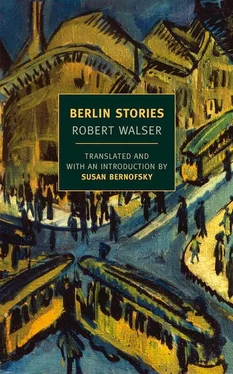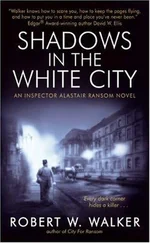Robert Walser - Berlin Stories
Здесь есть возможность читать онлайн «Robert Walser - Berlin Stories» весь текст электронной книги совершенно бесплатно (целиком полную версию без сокращений). В некоторых случаях можно слушать аудио, скачать через торрент в формате fb2 и присутствует краткое содержание. Год выпуска: 2012, ISBN: 2012, Издательство: NYRB Classics, Жанр: Классическая проза, на английском языке. Описание произведения, (предисловие) а так же отзывы посетителей доступны на портале библиотеки ЛибКат.
- Название:Berlin Stories
- Автор:
- Издательство:NYRB Classics
- Жанр:
- Год:2012
- ISBN:978-1590174548
- Рейтинг книги:4 / 5. Голосов: 1
-
Избранное:Добавить в избранное
- Отзывы:
-
Ваша оценка:
- 80
- 1
- 2
- 3
- 4
- 5
Berlin Stories: краткое содержание, описание и аннотация
Предлагаем к чтению аннотацию, описание, краткое содержание или предисловие (зависит от того, что написал сам автор книги «Berlin Stories»). Если вы не нашли необходимую информацию о книге — напишите в комментариях, мы постараемся отыскать её.
collects his alternately celebratory, droll, and satirical observations on every aspect of the bustling German capital, from its theaters, cabarets, painters’ galleries, and literary salons, to the metropolitan street, markets, the Tiergarten, rapid-service restaurants, and the electric tram. Originally appearing in literary magazines as well as the feuilleton sections of newspapers, the early stories are characterized by a joyous urgency and the generosity of an unconventional guide. Later pieces take the form of more personal reflections on the writing process, memories, and character studies. All are full of counter-intuitive images and vignettes of startling clarity, showcasing a unique talent for whom no detail was trivial, at grips with a city diving headlong into modernity.
Berlin Stories — читать онлайн бесплатно полную книгу (весь текст) целиком
Ниже представлен текст книги, разбитый по страницам. Система сохранения места последней прочитанной страницы, позволяет с удобством читать онлайн бесплатно книгу «Berlin Stories», без необходимости каждый раз заново искать на чём Вы остановились. Поставьте закладку, и сможете в любой момент перейти на страницу, на которой закончили чтение.
Интервал:
Закладка:
Some of the stories in this collection previously appeared — in translations by Christopher Middleton in two cases, Harriett Watts in one — in the 1982 collection Selected Stories of Robert Walser . In another case I inadvertently retranslated a story, “ The Tanners ,” that Middleton had published under a different title in his lovely Walser collection Speaking to the Rose: Writings 1912–1932 (University of Nebraska Press, 2005); I decided to let my translation stand so that the curious reader will have two versions to compare. Middleton’s translations of Walser, the earliest of which date to the mid-1950s, are spirited and alive in every sentence, displaying the depth and range of Walser’s imagination. I have done my best, in my own translations, to re-create the playful wit and profound sagacity that speak from every page of Walser’s prose.
— SUSAN BERNOFSKY
New York, September 2011
Berlin Stories
The City Streets
Good Morning, Giantess!
It’s as if a giantess were shaking her curls and sticking one leg out of bed when — early in the morning, before even the electric trams are running, and driven by some duty or other — you venture out into the metropolis. Cold and white the streets lie there, like outstretched human arms; you trot along, rubbing your hands, and watch people coming out of the gates and doorways of their buildings, as though some impatient monster were spewing out warm, flaming saliva. You encounter eyes as you walk along like this: girls’ eyes and the eyes of men, mirthless and gay; legs are trotting behind and before you, and you too are legging along as best you can, gazing with your own eyes, glancing the same glances as everyone else. And each breast bears some somnolent secret, each head is haunted by some melancholy or inspiring thought. Splendid, splendid. So it is a cold morning — half sunny, half gray — and many, many people are still snug in their beds: revelers who’ve lived and adventured their way though the entire night and half the morning, refined persons who make it a habit to arise late, lazy dogs that wake up, give a yawn, and go back to snoring twenty times in a row, graybeards and invalids who can no longer get up at all or only with difficulty, women who have loved, artists who say to themselves: Get up early? What rubbish! the children of wealthy, beautiful parents — fabulously coddled, sheltered creatures who go on sleeping in their own little rooms behind snow-white curtains, their little mouths open, immersed in fairy-tale dreams until nine, ten, or eleven o’clock. At such an early hour of morning, the wild maze of streets is all a-skitter and a-scurry with if not stage-set painters, then at least paperhangers, clerks who copy addresses, paltry insignificant middlemen, as well as persons intending to catch an early train to Vienna, Munich, Paris, or Hamburg, for the most part people of no significance, girls from all possible spheres of employment, working girls, in other words. Anyone observing this hubbub will have no choice but to declare it exceptional. He then walks along like this and is almost taken up by a compulsion to join in this running, this gasping haste, swinging his arms to and fro; the bustle and activity are just so contagious — the way a beautiful smile can be contagious. Well no, not like that. The early morning is something completely different. It flings, for example, one last pair of grimily clad night owls with loathsomely red-painted faces out of their barrooms and onto the blinding, dusty white street where they loiter, stupefied, for quite some time with their crooked sticks over their shoulders, annoying the passersby. How the drunken night shines forth from their sullied eyes! Onward, onward. That blue-eyed marvel, the early morning, has no time to waste on drunkards. It has a thousand shimmering threads with which it draws you on; it pushes you from behind and smiles coaxingly from the front. You glance up to where a whitish, veiled sky is letting a few scraps of blue peek out; behind you, to gaze after a person who interests you; beside you, at an opulent portal behind which a regal palace morosely, elegantly towers up. Statues beckon you from gardens and parks; still you keep on walking, giving everything a passing glance: things in motion and things fixed in place, hackney cabs indolently lumbering along, the electric tram just now starting its run, from whose windows human eyes regard you, a constable’s idiotic helmet, a person with tattered shoes and trousers, a person of no doubt erstwhile high standing who is sweeping the street in a top hat and fur coat; you glance at everything, just as you yourself are a fleeting target for all these other eyes. That is what is so miraculous about a city: that each person’s bearing and conduct vanishes among all these thousand types, that everything is observed in passing, judgments made in an instant, and forgetting a matter of course. Past. What’s gone past? A façade from the Empire period? Where? Back there? Could a person possibly decide to turn around once more so as to give the old architecture a supplementary glance? Good heavens, no. Onward, onward. The chest expands, the giantess Metropolis has just, with the most voluptuous leisureliness, pulled on her sun-shimmery chemise. A giantess like this doesn’t dress so quickly; but each of her beautiful, huge motions is fragrant and steams and pounds and peals. Hackney cabs with American luggage on top clatter past mangling the language. Now you are walking in the park; the motionless canals are still covered in gray ice, the meadows make you shiver, the slender, thin, bare trees chase you swiftly on with their icily quivering appearance; carts are being pushed, two stately carriages from the coach house of some person or other of official standing sweep past, each bearing two coachmen and a lackey; always there is something, and each time you wish to observe this something more closely, it’s already gone. Naturally you have a large number of thoughts during your one-hour march, you are a poet and can practice your art without removing your hands from the pockets of your — let us hope — respectable overcoat, you are a painter and perhaps have already finished five pictures during your morning stroll. You are an aristocrat, hero, lion tamer, Socialist, African explorer, ballet dancer, gymnast, or bartender, and you’ve fleetingly dreamed just now of having been introduced to the Kaiser. He climbed down from his throne and drew you into a friendly half-hour chat in which his lady the Empress may also have taken part. In your thoughts you rode the metropolitan railway, tore the laurel wreath from Dernburg’s brow, got married and settled down in a village in Switzerland, wrote a stage-worthy drama — jolly, jolly, onward, hey there, what? Could that be …? Indeed, then you ran into your colleague Kitsch, and the two of you went home together for a cup of chocolate.
1907
The Park
Soldiers on duty sit on a bench beside the entryway, I go in, dry, fallen leaves fly and swirl and sweep and tumble toward me. This is exceptionally amusing and at the same time contemplative; the lively is always more contemplative than what is dead and sad. Park air welcomes me; the many thousand green leaves of the lofty trees are lips that wish me good morning: So you’re up already too? Indeed, yes, I’m surprised myself. A park like this resembles a large, silent, isolated room. In fact it’s always Sunday in a park, by the way, for it’s always a bit melancholy, and the melancholy stirs up vivid memories of home, and Sunday is something that only ever existed at home, where you were a child. Sundays have something parental and childish about them. I walk on beneath the tall, beautiful trees, how softly and amicably they rustle, a girl is sitting all alone upon a bench, poking the ground with her parasol, her pretty head bowed, absorbed in thought. What might she be thinking? Would she like to make an acquaintance? A long, pale-green avenue opens up, here and there a person walks toward me, the benches meanwhile are only rather sparsely populated. How the sun does like to shine, for no reason at all. It kisses the trees and the water of the artificially constructed lake; I examine an old railing and laugh because it pleases me. Nowadays it’s fashionable to pause before old iron railings to admire their sturdy, delicate workmanship, which is a bit silly. Onward. Suddenly an acquaintance is standing before me: Kutsch, the writer, who fails to recognize me although I call out a friendly greeting. What’s wrong with him? By the way, I’d thought all this time he’d gone off to the African colonies. I hurry up to him, but all at once he vanishes; indeed, this was only a foolish delusion on my part: the spot beneath the tall oak tree where I thought I saw him is empty. A bridge! How the water glistens and shimmers in the sun, so enchantingly. But there’s no one rowing here, which makes the lake appear drowsy, it’s as if it were only a painted lake. Young people arrive. Strange, the way we look into each other’s eyes on a Sunday afternoon like this, as if we had something to say to one another, but we have nothing at all to say, we say to ourselves. A small, charmingly slender castle rises before me between the trees in the blue-and-white air. Who might have lived here? Perhaps someone’s mistress? I hope so, it’s an appealing thought. This place may once have swarmed with high and the highest nobility, hackney cabs and carriages and servants in green-and-blue livery. How deserted and neglected this stately edifice appears! Thank God no one notices, for if an architect were to come and renovate it with the help of his intellectual spectacles — with your permission, I’ll swallow this notion unpondered. What has become of us as a people that we can possess the beautiful only in dreams. An old woman and an old man sit there, I walk past and also pass a girl who is reading; no use trying to begin a romance with the words: “What are you reading, miss?” I am walking rather quickly, then suddenly stop: how beautiful and quiet such a park is, it transports you to the most distant landscapes, you find yourself in England or Silesia, you’re lord of the manor and nothing at all. The most beautiful thing is when you seem not to be conscious of the beauty and merely exist as do other things as well. I gaze down for a while at the silent, half-green river. Everything, by the way, is so green, and so gray, which actually is a color for slumber, for closing one’s eyes. In the distance, ringed with leaves, one sees the bluish dress of a seated lady. Cigarette smoking isn’t permitted here either. A girl laughs brightly, strolling between two young gentlemen, one of whom has his arm around her. Once more a view down an avenue of trees, how beautiful, how quiet, how strange. An old woman comes toward me, her delicate, pale face framed in black, these old, clever eyes. In all honesty, I find it magnificent when a solitary old woman walks down a green avenue. I reach a bed of flowers and other vegetation where, on a pretty, shady bench, sits a Jew. Should it have been a Teuton, would that be better? A small statue stands surrounded by flowers in a circular bed, I walk slowly around its edge, and now the reading girl appears once more, she’s reading as she walks, studying French under her breath. This marvelous boredom that is in all things, this sunny seclusion, this halfheartedness and drowsiness beneath the green, this melancholy, these legs, whose legs, mine? Yes. I’m too indolent to make observations, I gaze down at my legs and march onward. I mean it: Sundays only exist around the family table and on family walks. The single adult person is deprived of this pleasure, he might as well, like Kutsch, set off for Africa at a moment’s notice. Besides, what a loss it is to have turned twenty-five. There are compensations, but at present I want nothing to do with them. I’m on the street now, smoking, and step into a respectable pub, and here I am at once master of my surroundings. Beautiful park, I think, beautiful park.
Читать дальшеИнтервал:
Закладка:
Похожие книги на «Berlin Stories»
Представляем Вашему вниманию похожие книги на «Berlin Stories» списком для выбора. Мы отобрали схожую по названию и смыслу литературу в надежде предоставить читателям больше вариантов отыскать новые, интересные, ещё непрочитанные произведения.
Обсуждение, отзывы о книге «Berlin Stories» и просто собственные мнения читателей. Оставьте ваши комментарии, напишите, что Вы думаете о произведении, его смысле или главных героях. Укажите что конкретно понравилось, а что нет, и почему Вы так считаете.












